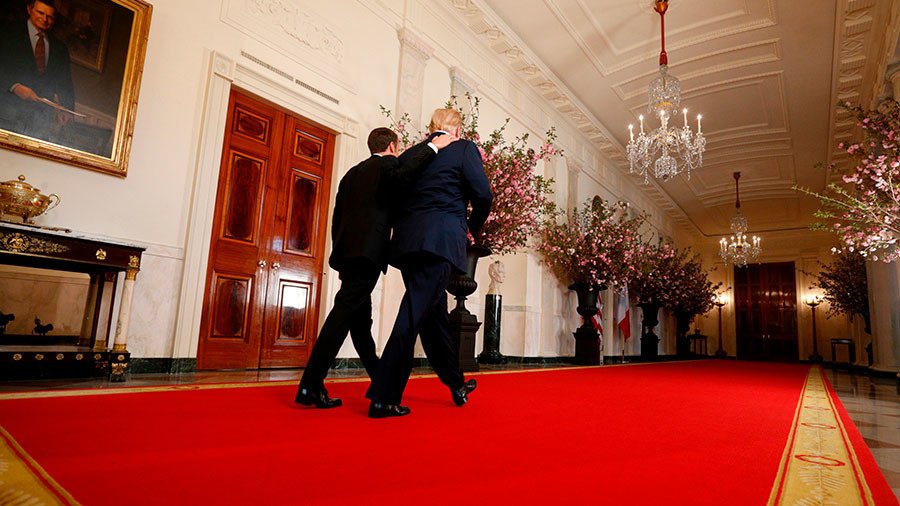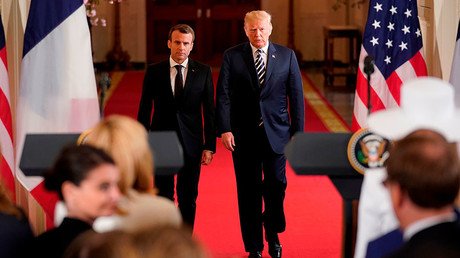Emmanuel Macron went off script this week when he indulged Donald Trump’s belligerence towards Iran, calling for a “new nuclear deal” with Tehran. Germany’s Angela Merkel needs to pull rank on Macron to avoid a Middle East war.
Macron did later call pulling out of the Iran accord “insane,” but he nevertheless gave Trump a green light to do so, instead of urging US commitment to an international treaty.
The French president took a radical turn in Washington from Germany and the rest of the European Union regarding the Iran deal. When Chancellor Merkel arrives in Washington Friday – the day after Macron’s departure – she should let the American president know in no uncertain terms that the French leader was out of his depth.
Following Macron’s remarks Tuesday alongside President Trump at the White House about renegotiating a new deal, Germany and the EU’s foreign policy chief Federica Mogherini pointedly said there was no alternative to the existing agreement.
Their position was reiterated by Russia and China, which said a new accord was not on the agenda.
Iran’s leadership also rebuked the idea of rewriting the 2015 international deal. President Hassan Rouhani questioned the right of the US and French leaders to unilaterally amend a treaty ratified by the United Nations.
During his three-day US state visit this week, Macron went from defending the nuclear accord with Iran to capitulating to President Trump’s demand for a new deal.
Trump is threatening to walk away in the next two weeks from the 2015 Joint Comprehensive Plan of Action (JCPOA) limiting Iran’s nuclear development – unless the accord is fundamentally renegotiated. Trump wants to add stringent clauses to prevent Iran advancing ballistic missile technology, as well as monitoring Iranian regional activities.
Macron kicked off his US tour by asserting “there was no Plan B” to the existing nuclear deal signed in July 2015 by Iran and the five permanent members of the UN Security Council – the US, Russia, China, Britain and France – plus Germany.
In a matter of days, following behind closed-door discussions with Trump, Macron shifted significantly. While the French leader told the US Congress in an address the following day that his country would not quit the JCPOA, he did, however, maintain a double-think position by saying, “We wish to from now on work on a new deal with Iran.”
Moreover, Macron indulged Trump’s hostile view of Tehran. He said the whole purpose of the JCPOA was to ensure Iran “never possesses nuclear weapons,” and that the accord must be modified to become a policing mechanism for Iran’s involvement in Syria and the region. Macron was implying Iranian malfeasance was a top concern.
If Trump withdraws the US from the nuclear accord as he is threatening to do on May 12, and begin reimposing American sanctions on Tehran, Iran has warned it will resume its uranium enrichment program. With tensions already heightened between the US, Israel and Saudi Arabia towards Iran, it is very plausible that scrapping the JCPOA will trigger a war in the Middle East.
Macron’s purpose in the US was supposedly to convince Trump to stay in the nuclear accord. This week’s spectacle of bonhomie and so-called bromance was billed as Macron using his charisma and much-vaunted special relationship with Trump to win him over. In the end, Macron’s charm offensive came to nothing. It was the French politician who succumbed to Trump when he agreed that the Iranian nuclear accord would have to be comprehensively rewritten, as well as giving credence to Trump’s hostile caricature of Iran as a malign power.
Macron is thus pandering to Trump’s war drive towards Iran, lending propaganda fuel to claims by Washington, Israel and Saudi Arabia for the imperative to roll back Iranian influence. Macron shamefully portrayed Iran’s legal presence in Syria – where along with Russia and Hezbollah it defeated Western, Saudi and Israeli-backed terror proxies – as somehow nefarious and illegal. Talk about audacity, given France’s alleged record of criminal involvement in fomenting the Syrian war.
A big part of the problem here is that Macron’s egotistical ambition seems to have taken over. Ever since he was elected as president last May, Macron has flaunted his vision of “making France great again.” Even the French media have squirmed with discomfort over his grandiose pretensions, mockingly comparing himto the “Sun King” Louis XIV.
In Germany, too, there has been some schadenfreude over what is perceived as Macron eclipsing Merkel as the “new leader of Europe.” This week, Der Spiegel even went as far as lauding Macron for his decisiveness to join US and British airstrikes on Syria earlier this month.
Macron has courted Merkel as a partner in reforming the European Union. But one wonders if Macron’s quest for global statesmanship and French greatness has reached the point where he views Merkel as an accessory, rather than partner.
One thing about Macron’s biography is his acumen for leveraging relationships for his own advancement. He curried favor with former French President Francois Hollande to gain a political appointment as economic minister in his government. Then the former investment banker ditched the Socialist Party to set up his own En Marche movement just in time to enter the 2017 presidential election. Since his election, Macron has spurned Hollande.
Over the past year in office, Macron’s zeal to overhaul French labor rights has incensed many of his erstwhile supporters on the political left, who now reportedly regret voting for him.
Macron’s political self-aggrandizement can be discerned in the way he has courted favor with Trump. His hosting of Trump at last year’s Bastille Day celebrations in Paris seduced the American president’s ego with military parades, pomp and ceremony. So much so that Trump wants to organize a similar annual military display in Washington.
Trump returned the hospitality by inviting Macron and his wife Brigitte for a three-day state visit this week. It was the first official state reception afforded to any world leader by Trump.
By contrast, Merkel will be received by Trump on a low-key, one-day working visit to the White House. Again in contrast to the glad-handing and smooching between Trump and Macron this week, one recalls the frosty awkwardness during Merkel’s previous visit to the White House, when the American president barely shook her hand.
This posturing by Macron as the de facto leader of Europe who presumes to be the “go-to guy” for Trump suffers from a reality-deficit.
Despite Macron’s illusions of grandeur, Germany is the European powerhouse by virtue of its incomparable economic prowess. France’s economy lags in third place, and its fiscal problems of debt are a cause for German disdain. For Macron to pose as the leader of Europe is a case of getting too big for his boots.
But what is even more intolerable is Macron’s presumption to give a European imprimatur to Trump’s hostility toward Iran and the internationally agreed nuclear accord.
When Merkel meets Trump, one can expect the optics to appear staid and lackluster, unlike the panache of Macron’s visit. Nevertheless, Merkel in her quietly spoken way must tell Trump that there will be no European support for his bad-faith policy towards Iran. And in that way, Merkel needs to pull Macron and his ego firmly into line.
Think your friends would be interested? Share this story!
The statements, views and opinions expressed in this column are solely those of the author and do not necessarily represent those of RT.



